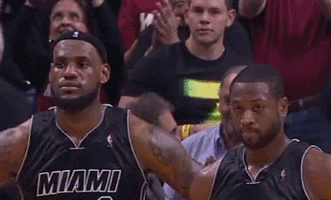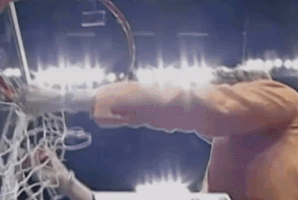These Are the Only Factors Regarding Kevin Durant's Decision That Matter
Free agent Kevin Durant agreed to terms with the Golden State Warriors. This marks the first time in NBA history that consecutive MVPs will play on the same team (Durant won the award in 2014, Stephen Curry won the award in 2015 and 2016). Durant’s decision has received flagrantly dismissive analysis from purported “experts” characterizing his decision as employing an, ‘if you can’t beat em join em’ strategy. Needless to say, the experts are wrong. But in their defense, their off-based analysis ignores several factors, while focusing on their ‘disappointment as fans.’
The following disregards fandom and considers every relevant element that persuaded Durant. Any player with the talent of Durant inevitably has impossible expectations thrust upon them. His diverse basketball skillset is both a blessing and a curse. No matter what arena Durant enters, he is expected to perform on a superstar level. To his credit, he has done just that. But that’s part of the problem. Durant has mustered all of his energy and effort in every game of his career, yet he continually falls short of winning a championship.
So what are his options? Stay in Oklahoma City and hope things change? Play harder? Lure free agents to Oklahoma by taking a pay cut? What?
First, tomorrow is not promised to anyone. No person can be expected to remain in a situation they believe is not in their best interest because of the possibility for prevailing in the future. Second, it’s well established that his effort and skill were maximized in Oklahoma City. Third, it’s not Durant’s responsibility to act as team recruiter or to diminish his earnings potential. Fans expect athletes to accept pay decreases in the tens of millions as if they would willingly accept a substantial (avoidable) pay decrease. How about this, start expecting billionaire NBA owners to pay the (non exorbitant) luxury tax rather demonizing athletes for accepting contracts that allow them to change the fortunes of their families for generations.
People who claim Durant joining the Warriors is different than LeBron James forming a super team in Miami are devoid of basic logical reasoning ability. James left Cleveland a year after reaching the NBA Finals. His team was formidable and strong enough to be just as competitive every year. However, being just as competitive was insufficient to James who (like Durant) was weighing the affect never hoisting the trophy on his legacy. As a result, James left.
And he left in grand fashion forming one of the greatest teams ever assembled. With Kobe’s career trajectory on a downward spiral, former Finals MVP Dwayne Wade had uprooted Kobe as the best active shooting guard. With Kevin Love’s defensive deficiencies and Serge Ibaka’s unpolished offensive game, Chris Bosh was the hands down top power forward in the game, and James was the unequivocal best small forward in the league. Thus, the Miami Heat started three players who, in their primes, were the best at their position. That’s never happened before in league history. The league had seen remarkable duos from Magic and Kareem to Jordan and Pippen to Kobe and Shaq, but the league had never before seen three of the top five players on the same team. It was a real life super team.
Again, why James formed this super team is critical. He formed the Miami super team in order to expand his championship window in his physical prime. In James’ estimation, staying in Cleveland would not have been conducive to winning championships, thus the decision to leave was an inconvenient necessity. Three years later James utilized the questionable health of Wade to make a convenient return to a team that had an all star point guard, a top draft pick, and trade worthy assets, capable of acquiring perennial all star Kevin Love. Not only should James not be condemned for such calculations this model should be adopted by future stars able to position themselves to earn such leverage.
Durant is not the first star to join a competitive team in pursuit of an elusive championship. Charles Barkley, Clyde Drexler, Gary Payton, and Karl Malone all joined competitive teams while chasing rings. The reaction from many when Durant is compared to those all time greats is, “they were not in their prime.” That is the single most asinine reasoning for criticizing an athlete’s ambition to win.
So what do those people recommend? Should Durant accept failure and a subpar supporting cast until he is in the twilight of his career? No. That’s idiotic. Sorry, it really is. Seriously, fans expect him to suffer in a titleless purgatory because he’s still relatively young. That’s just dumb.
It would be remiss to ignore the dramatic cultural difference in Oklahoma City and California’s Bay Area. As an undergrad I had the misfortune of visiting Oklahoma. It was an uncomfortable and downright scary experience. Granted, I don’t know thousands of people, but I’ve met people of color in ALL eight of the states I’ve called home and each of them had a negative experience in Oklahoma. To be fair, I’m sure plenty people of color who call Oklahoma home are pleased to live there and may never to leave — more power to them. But life is too precious to remain in a place that is unwilling to fully embrace other people’s humanity.
Not to cast aspersions on Oklahomans, but it is neglectful to analyze the decision of a black man to leave Oklahoma and head west without acknowledging the existent racial tensions still very prevalent in Oklahoma. It is possible Durant was so enthralled with preparing for competition that he was oblivious to any racial strife. But it is equally plausible that The South wore on him and his departure was predetermined notwithstanding the outcome of the 2016 playoffs.
Folks who have had the fortune of spending time in The Bay would agree it is the most diverse, and accepting place in the United States. Comparing Oklahoma City and The Bay is like comparing an iguana to a golden retriever.
Durant is allowed to seek new professional challenges. Though on paper his new team appears to give him a better chance of winning, they still have to play the games. Recall, Miami’s super team was unsuccessful in its original bid to win a title.
Chasing rings is chasing rings. Whether chasing them in ones prime or chasing them as the wheels are falling off, chasing is chasing. LeBron James chased, the all time greats listed above chased, and now Durant is chasing. Guess what…it’s okay! Super teams sellout every arena they visit, and draw more intrigue and revenue from casual basketball fans.
This is a new era. Traditionalists struggle with the idea of players joining rival franchises because they long for the reincarnation of the Bird – Magic, Isiah – Jordan era. That league is long gone. With the liberal issuance of flagrant/technical fouls, shared agents, and similar shoe contracts, the violence and legitimate off-the-court rivalries that once consumed the NBA are now a prehistoric afterthought unlikely to return. So folks who ‘expected’ Durant to make a life changing decision based on their old school nostalgia are disappointed – oh well.
Since virtually all programming has ignored the elephant in the room, I won’t…Russell Westbrook was a liability to Durant’s long-term success. Despite their familial relationship and unbreakable bond, Westbrook’s play is not immune from criticism for the Thunder blowing more fourth quarter leads than any team in the league. That is a statistic born of inept coaching and poor decision-making at the point guard position. Westbrook is a freakishly talented athlete with a manic competitive spirit. But his inability to harness his in-game rage turned into last second madness and cost his team often. As the point guard and primary ball handler, Westbrook should be assessed the majority of blame for those collapses.
At the end of the day the only reaction to Kevin Durant’s decision that matters is not mine or yours it’s Kevin Durant’s. ‘Can’t beat em join em,’ will be remembered as the most ignorant and lazy misrepresentation of Durant’s decision.
























